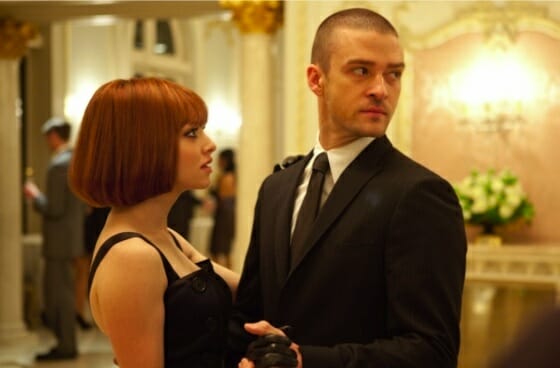
With its clunky script and unsound message, In Time could be the work of an overambitious adolescent who just discovered a book on wordplay and the dystopian literature section in the library. The film, written and directed by Andrew Niccol, mishmashes a slew of genres and ideas into one big, laughable mess.
In Time tells the story of Will Salas (Justin Timberlake), a poor day laborer who lives in a futuristic society where humans stop aging at 25 and die at 26 unless they buy more time because, as the trite advertisements for the film proclaim, “time is money—literally.”
Alas, the system is corrupt. The rich live forever, the poor die young and the government keeps a close eye on everyone—with surveillance cameras and regulated time zones—to ensure the system stays intact.
When Salas suddenly finds himself with over a century of time, he becomes determined to change everything. Alongside his new partner and lover, Sylvia Weis (Amanda Seyfried) the daughter of a wealthy businessman (Vincent Kartheiser), he embarks on a mission to bring equality to his unjust world, all while avoiding a “timekeeper,” aka cop (a middling Cillian Murphy), who believes Salas has committed murder.
In some ways, the story actually sounds appealing—there have certainly been more outlandish premises turned into solid films—but In Time simply doesn’t work. It doesn’t help that Niccol brings it to the screen so literally. He places actual clocks on the characters’ arms and creates a world so hackneyed that 99 Cent Only stores merely transition into 99 Second Only stores. It’s a dystopia without an imagination.
Making matters worse, Niccol never establishes a consistent tone or genre. Early on, In Time plays as a straight drama before evolving into an action blockbuster that borrows from the likes of Robin Hood and Bonnie and Clyde. Then it morphs into a political thriller. There’s no ironclad rule that says a film cannot partake of multiple genres and still be good, and Niccol may know where he wants to take the audience—there’s just no evidence he knows how to get there. This results in confusion as the audience seeks to understand what exactly they are watching.
We see the same unevenness in Salas’ character. At the beginning of the film, he appears to be a pretty normal guy. Once he gets over 100 years of time, though, he suddenly becomes a crusader out to bring the system down, flaunting his six-pack abs, driving getaway cars, fighting crime and spitting out one-liners at bad guys.
All this becomes unintentionally laughable, especially in regard to the dialogue. As if he just learned what a play on words is, Niccol puns on the word “time” relentlessly. Over and over, characters deliver lines like, “Don’t waste my time,” “Let’s have some quality time,” “You sure took your time,” and so on.
But even were the dialogue better, In Time lacks the believable characters to give it life. As the protagonist, Timberlake is in over his head—especially with a script so lacking. In an early scene, when he attempts to cry, it plays like one of the comedic skits in which he performs so admirably from Saturday Night Live—laughable. Salas has no depth or sincerity and thus draws no sympathy.
Seyfried fares no better as his counterpart. Her character functions as a lifeless robot with no heart or soul, and for two attractive people, there’s a curious lack of chemistry between Timberlake and Seyfried. As for Kartheiser, who plays her greedy father, he simply goes through the motions of Peter Campbell, his character on Mad Men.
As if the film couldn’t get any worse, its message falls apart, as well. Through Salas’ plan to bring justice to the world, Niccol seems to be making an argument for socialism, contending that economic equality would solve all the world’s problems, a common ideology of our times.
While certainly filled with hope—the only redeeming part of the film—such a message naively assumes the poor are uniformly good and the rich uniformly bad, as if everyone doesn’t have the potential to be selfish, greedy and depraved. Such a premise, like the film itself, is far too shallow. To borrow from the same vein of puns so relentlessly mined by its director—seeing In Time is a waste of both time and money.